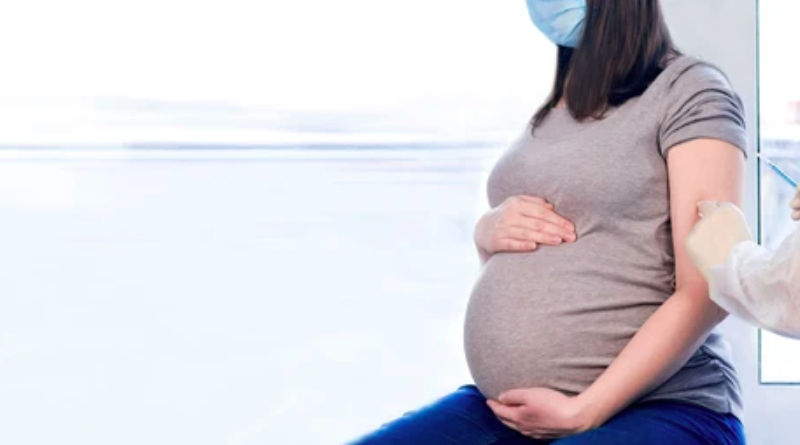COVID-19 Infections in Pregnancy Rise as Vaccination Rate Stays Low
By Lauren Girgis
Reporting Texas

Lauren Lewis couldn’t even get out of bed to use the bathroom without her husband’s help after she contracted COVID-19 three months into her pregnancy. The first morning she noticed symptoms, she woke up feeling like she had been “hit by a train.”
Lewis, 34, said she suffered from every symptom on the list when she got COVID-19 after reluctantly attending an in-person work meeting. It took her a month to recover, and she had to take blood thinners for the remainder of her pregnancy to prevent blood clots, which pregnant women are more at-risk from when they contract COVID-19.
“I did not start to feel better until Thanksgiving,” said Lewis, who was exposed on Nov. 5, 2020. “I remember the day we were sitting there for Thanksgiving dinner and I mean, that was the first time I was really able to eat.”
Pregnant people are at increased risk for severe illness from COVID-19. In recent months, health officials have been raising alarms that the group needs to urgently get vaccinated.
The highest number of coronavirus-related deaths in pregnant people in a single month of the pandemic was reported in August 2021, according to a Sept. 29 health alert from the U.S. Centers for Disease Control and Prevention. The CDC estimates only about 31% of pregnant people are fully vaccinated. This number is even lower for Black pregnant people, at 15.6%.
Dr. Alison Cahill, a maternal-fetal medicine specialist and professor in the Dell Medical School Department of Women’s Health, said doctors have seen the rise due to the Delta variant, which is about two to three times more contagious than the original COVID-19 strain.
“We’ve had really a very large number of [pregnant] folks develop severe disease, become hospitalized, [and] require ECMO, which is the lung bypass,” Cahill said. “We’ve seen pretty horrible consequences.”
Lorrie Harris-Sagaribay is a specialist at MotherToBaby, a nonprofit that answers questions about exposures during pregnancy and nursing. Harris-Sagaribay said one of the biggest concerns they hear related to the vaccine is the lack of data and information about long-term effects on the baby.
“Unfortunately, pregnant people were excluded from the phase three trials of the vaccine, though many of us with national hats on advocated very strongly for them to be able to be included,” Cahill said. “ So we were behind in our understanding of direct data amongst pregnant people.”
Harris-Sagaribay said there is more information about vaccine safety in pregnancy now, and her organization looks to the studies to reassure pregnant people hesitant about getting vaccinated.
“A COVID-19 infection in pregnancy not only increases the chance of being very sick. … It also increases the chance of pregnancy complications, including preterm delivery,” Harris-Sagaribay said. “Some studies have also found increased rates of preeclampsia, which is dangerously high blood pressure, stillbirth, and effects on the placenta that could affect the baby’s growth.”
Lewis, who documented her experience having COVID-19 and getting vaccinated while pregnant on social media, said many pregnant women reached out to her, including Brittany Clay.
Clay found out she was pregnant in October 2020. Shortly after, her grandfather died of COVID- 19, and her parents were hospitalized with the virus.
“We had been taking it seriously, but then we were kinda a bit terrorized, and so we were very, very careful through the fall,” Clay said. “When the vaccine became available, I initially was thinking ‘I’m gonna wait.’ … But the more I talked to personal friends of mine who got COVID while pregnant, and with the scare from my parents and my grandfather and another relative, I realized, I didn’t want to even take a chance with not having that additional protection.”
Lewis had no complications when delivering her baby boy, Langston, in April. But he now has difficulty breathing at only five months old, which Lewis’ doctors can’t confirm is from her illness with COVID-19. Lewis had to get a machine from her doctor to help break up his congestion.
The toll of the disease still impacts her, even as she has technically “recovered.” She had a barking cough for two months, and felt guilt over the fact her husband, daughter and parents also got COVID-19 when she contracted it.
Her struggle with the disease has led her to see a therapist, and she developed anxiety about getting as sick as she was with COVID-19 again.
Lewis implores other pregnant women to do their own research and make the best decision for protecting their families.
“I chose to get vaccinated because I never wanted to feel the way that I felt when I was sick with COVID,” Lewis said. “There are more benefits to getting [the vaccine] than to not getting it. We need to get out of the ‘me, me, me’ mindset. Think about our impact as a whole.”